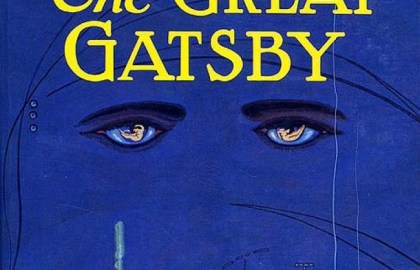“Gatsby”: Still Pretty Damn Great

I’m a little wary of defending The Great Gatsby. Not because I’m wary of the book, which I’ve loved with a passion since age sixteen, but because I can’t speak nearly as well on the book’s behalf as the book does. Gatsby doesn’t really need another reverent critic; it’ll continue to be taught in classrooms and enjoyed by sensitive readers of every generation.
By the same token, it’s well beyond serious vulnerability to hecklers, despite any encouragement the new film version may have given them. Last month The New Yorker‘s Joshua Rothman informed us that “Baz Luhrmann’s ‘The Great Gatsby‘ is lurid, shallow, glamorous, trashy, tasteless, seductive, sentimental, aloof, and artificial. It’s an excellent adaptation, in other words, of F. Scott Fitzgerald’s melodramatic American classic.” Kathryn Schulz declared in Vulture that she flat-out “despise[s]” the novel. Tellingly, neither writer quoted more than a line or two of the actual text. Here’s the despicable, trashy, aloof melodrama they’re railing against:
“If it wasn’t for the mist we could see your home across the bay,” said Gatsby. “You always have a green light that burns all night at the end of your dock.”
Daisy put her arm through his abruptly but he seemed absorbed in what he had just said. Possibly it had occurred to him that the colossal significance of that light had now vanished forever. Compared to the great distance that had separated him from Daisy it had seemed very near to her, almost touching her. It had seemed as close as a star to the moon. Now it was again a green light on a dock. His count of enchanted objects had diminished by one.
To me this is as delicate and keenly felt as a passage of prose can get. Its romantic grace notes (“as close as a star to the moon”) are perfectly offset by skeptical realism (Gatsby’s self-absorption in this crucial moment). That last line takes a little something out of me every time I read it. Rothman can call this melodrama if he wants, but beside Fitzgerald’s total control, it’s his ten-adjective denunciation that looks excessive.
Faced with such a gulf between criticism and text, I’m tempted to throw up my hands and second Joyce Carol Oates: “Hating ‘The Great Gatsby’ is like spitting into the Grand Canyon. It will not be going away anytime soon, but you will.” But another New Yorker contributor, Sam Sacks, reminds us that:
…it’s no good airily dismissing a wrongheaded dismissal. If some marauding Philistine attacks a book you love, you have no choice but to gird your loins and fight for it. Because the only time the classics can expect to find peace is when the dreaded day comes that nobody is reading them.
Besides, the Big Think editors graciously invited me to speak my piece. And so–to the barricades!
I can’t deny the book’s obvious faults (including the notorious Meyer Wolfsheim caricature) or erase its associations, for so many readers, with sweaty high school classrooms. The best I can do is say what I think it is besides “the great American novel.” This label has become a target on its back, and has distracted from its remarkable universality. Gatsby is not only a dissection of the American Dream but of dreams in general: their terrible necessity, their built-in futility. Its best lines on the subject—”the high price of living too long with a single dream”; “There are only the pursued, the pursuing, the busy and the tired”; “No amount of fire or freshness can challenge what a man will store up in his ghostly heart”—have an almost scriptural quality, reverberating far beyond their immediate context.
It’s also a particularly trenchant study of male desire, male illusion. Although the female characters in Gatsby don’t exactly come out looking saintly, there’s something ferocious about the way the book skewers men. What is Gatsby’s house but a monumentally failed mating display? Is there a harsher portrait of waning virility than Tom Buchanan: insecure bully and womanizer, “one of those men who reach such an acute limited excellence at twenty-one that everything afterward savors of anti-climax”? Meanwhile George Wilson is a hysterical cuckold, and even Nick cuts a slightly Prufrockian figure, looking forward at thirty to “a thinning brief-case of enthusiasm, thinning hair.”
Fitzgerald may be unsparing in these judgments, but he’s hardly “aloof.” For one thing, his prose vibrates with the sympathetic observation that is the pride of any good novelist. Here’s Gatsby after he nearly chickens out on his elaborately arranged reunion with Daisy:
She turned her head as there was a light, dignified knocking at the front door. I went out and opened it. Gatsby, pale as death, with his hands plunged like weights in his coat pockets, was standing in a puddle of water glaring tragically into my eyes.
With his hands still in his coat pockets he stalked by me into the hall, turned sharply as if he were on a wire and disappeared into the living room. It wasn’t a bit funny. Aware of the loud beating of my own heart I pulled the door to against the increasing rain.
But it is funny (notwithstanding Schulz, who calls the novel humorless), and the poignant physical comedy of the scene helps flesh out the abstraction that even Gatsby’s admirers sometimes claim he is. It cuts him down to what Nick calls him later in the scene, a grown man “acting like a little boy.” Yet it also makes him “dignified” in the way that only a very earnest child can be.
Notice that both of these perspectives belong to Nick, who in the subtlety of his voice and stance may be the book’s finest achievement. Critics have often observed that Gatsby and Nick embody two sides of the author: the side that dreamed big, yearned after Zelda, and so on, and the side that maintained an ironic distance from those dreams. The tension this schism generates reminds me of Yeats’s observation that the quarrel with others produces rhetoric, while the quarrel with the self produces poetry. What really saves Fitzgerald from aloofness in Gatsby is the intimacy of his self-quarrel.
In the first chapter Nick famously declares himself “inclined to reserve all judgments.” Actually he judges everyone and everything, with devastating Midwestern understatement. And yet—here we, too, need to exercise restraint—hedoes withhold final judgment on his main subject, Gatsby. He is alternately charmed by, disgusted with, worshipful of, and perhaps even attracted to the man, until his ambivalence spins outward into the far-reaching meditation that closes the novel.
This passage (“Gatsby believed in the green light…”) is anything but a sermon. It’s Nick’s belated eulogy for his friend, his attempt to improve on the words of his only fellow mourner at Gatsby’s funeral: “That poor son-of-a-bitch.” It is, crucially, an apology for Gatsby: Nick justifies the flawed life in terms of the flawed nation only because the life would seem too tawdry otherwise. By extension The Great Gatsby is the author’s grand apology for self and country—which is not the same thing as a book that needs excusing.
When critics portray Fitzgerald as a Gatsbyesque failure, I think they’re trying to out-Nick Nick. They view themselves as sympathetic to, but a little shrewder than, the revelers next door: everyone still celebrating the Gatsby myth, from romantic teenagers to rap stars to Hollywood directors. In reality they’re more like the guests who undermine Gatsby by spreading tall tales about him. (Schulz writes that Fitzgerald in Gatsby “all but invent[ed] a new narrative mode: the third-person sanctimonious.” Never mind that the story is told in the first person, by a character whose judgmental nature is carefully ironized. And if Schulz thinks literary sanctimony began in 1926, what does she make of The Scarlet Letter?)
In their own way, of course, these guests pay a compliment by attending the party in the first place. The Great Gatsby turns 87 this year and remains the most readable of required reading. It’s not perfect; at times it’s not even pretty; but it’ll still be enchanting people in 2100. Why not shrug off the naysayers and raise a champagne toast?





